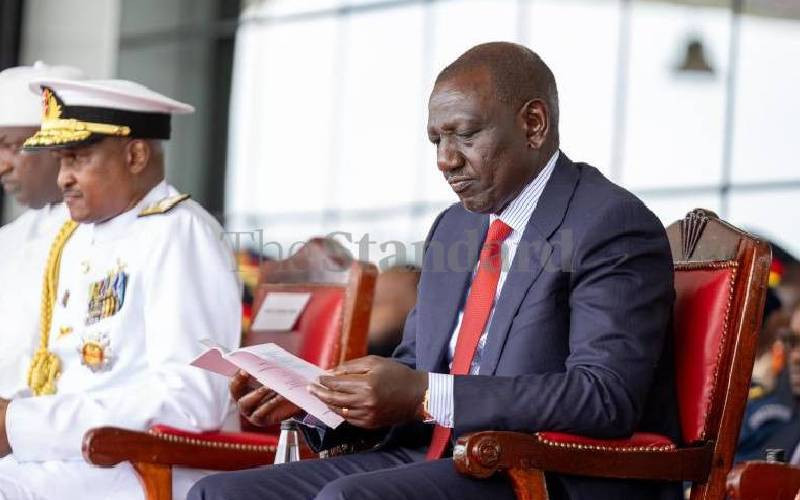Six months to the August 2022 elections, I penned a piece in this space urging the local media to observe and fortify public interest. Give it to them, they did.
As the campaigns peaked, odds were stuck against the press. Kenya Kwanza principals persistently accused media houses - they still do without evidence - of cock-eyed reporting.
In Azimio, there wasn't much drama. They seemed happy with campaign coverage but their candidate Raila Odinga's withdrawal from the July 26 presidential debate gave them away.
In a stimulating report titled 'Media performance and press freedom violations pre, during and post the August 9', the Media Council of Kenya admits that reporting of the last election was by far professional compared to 2017 and 2013.
Indeed, there were no major hate incidents via mainstream media. Live sessions and debates were properly moderated and there was an honest shot at fairness. What this meant, ideally, is that public interest was the exclusive motivation of the news media that time.
Globally, debate around public interest rages. You can call it public good, public benefit or the common good. News value theory explains how reporters and editors decide what news is. However, what constitutes public interest tantalises even seasoned journalists.
Some observers aver that public interest should be media interest. Others say it's only but what grounds the industry and its ethics. Whatever the case, political crosswinds, ethical dilemmas, commercial interests and pressures from schemers should never obstruct common good.
Public interest must start with the justification of media's ability to decide what's for the greater good. But notably, the measure of whether journalists are upholding public interest must be seen in the trust of the audience rather than news subjects. Trust in news is a big concern. It fell to 40 per cent globally this year, according to the Reuters Digital News Report.
In the recent past in Kenya, a trend has cropped up where journalists and editors get carried away or simply overthink crime or scandal stories to the extent that what they publish comes out as a manipulation of public opinion - for whatever reason - with the least ingredients of public interest.
There've been countless cases of families of suspects linked to terror, drugs, murder and graft being embarrassingly paraded in the news media. They endure public diatribes and even death threats all because reporters are seeking juicy story angles no matter what.
While a scribe's job is to find out more about a story, we may be camouflaging unprofessionalism with a shallow defence of public good.
Do we go the whole hog to expose 'faces' behind the 'face' in supposed crimes or take the easier route of exposing families and their little feuds, and publishing photos of innocent and sometimes coerced kin under dramatic headlines?
Days ago, there was the story of Pauline Wanjiru, mother of a businesswoman linked to the Sh17 billion oil shipment saga who 'didn't know my daughter was filthy rich.' Stage-managed to carry a newspaper bearing the image of her daughter, she claimed they hadn't met for six years. Was this the most compelling angle about the oil puzzle woman?
Remember the curious case when reporters interviewed Kiraitu Murungi's mother Anjelika Kiajia over graft claims against her son in the infamous Sh7 billion Triton saga?
When stories invade privacy and leave families with an egg in the face just because their kin are implicated in a crime, the media is profiling and publicly 'lynching' them against basic principles of justice.
Stay informed. Subscribe to our newsletter
It's kin punishment where a family in a situation of vulnerability is forced to share responsibility for a crime by one member, sometimes a private citizen not even proven guilty.
When we consume a story and then ask 'So what?' then something is amiss with our public interest value. Juicy story angles must be tampered with truth and sanity.
-The writer is a communications practitioner. X: @markoloo
 The Standard Group Plc is a
multi-media organization with investments in media platforms spanning newspaper
print operations, television, radio broadcasting, digital and online services. The
Standard Group is recognized as a leading multi-media house in Kenya with a key
influence in matters of national and international interest.
The Standard Group Plc is a
multi-media organization with investments in media platforms spanning newspaper
print operations, television, radio broadcasting, digital and online services. The
Standard Group is recognized as a leading multi-media house in Kenya with a key
influence in matters of national and international interest.
 The Standard Group Plc is a
multi-media organization with investments in media platforms spanning newspaper
print operations, television, radio broadcasting, digital and online services. The
Standard Group is recognized as a leading multi-media house in Kenya with a key
influence in matters of national and international interest.
The Standard Group Plc is a
multi-media organization with investments in media platforms spanning newspaper
print operations, television, radio broadcasting, digital and online services. The
Standard Group is recognized as a leading multi-media house in Kenya with a key
influence in matters of national and international interest.





